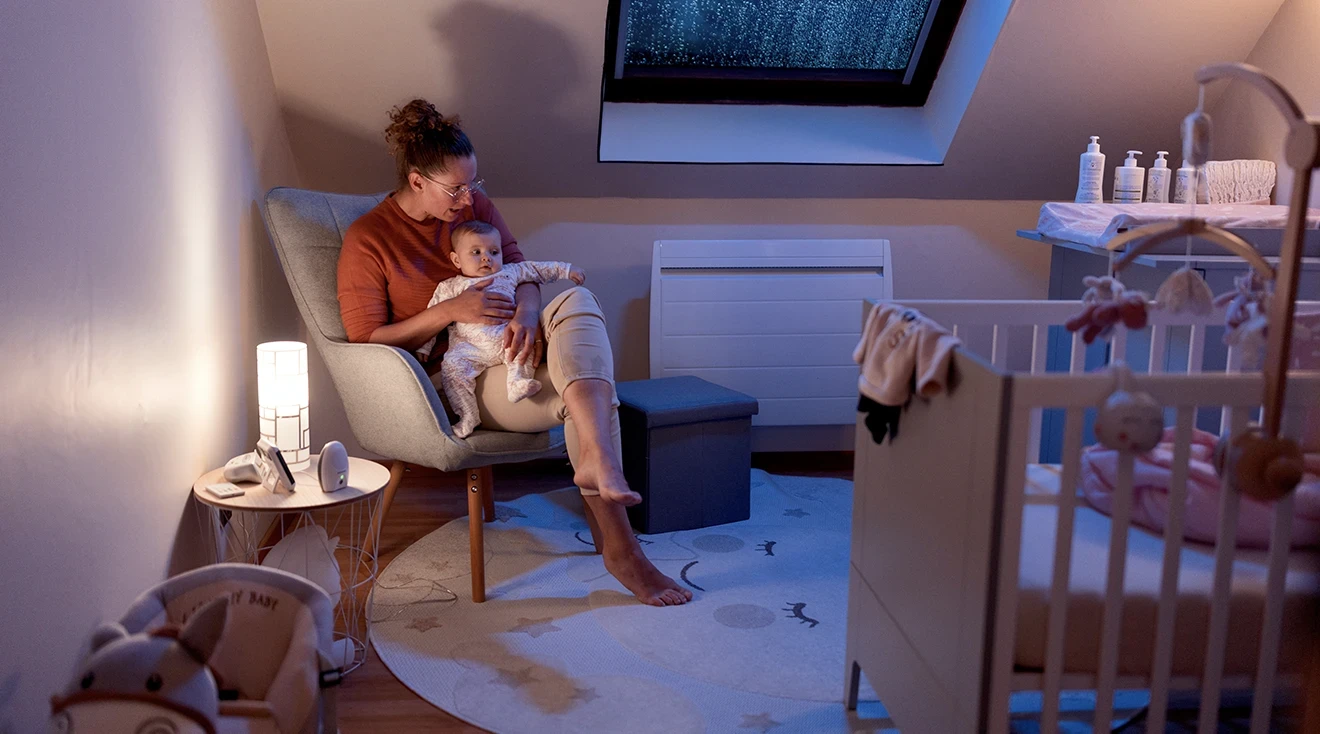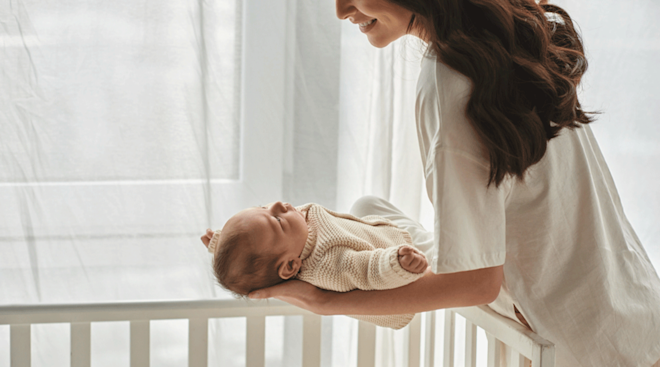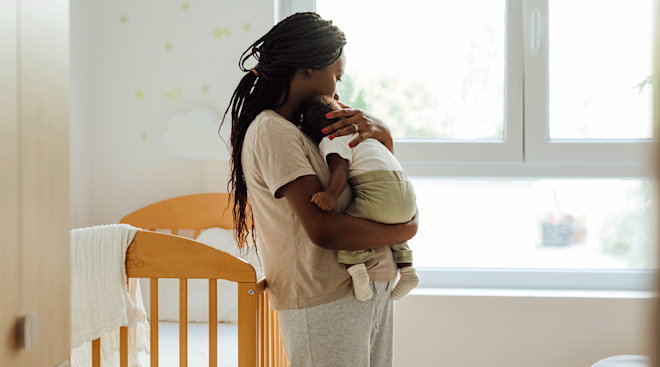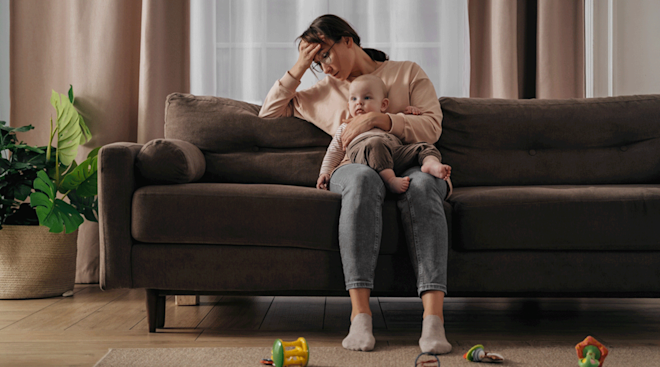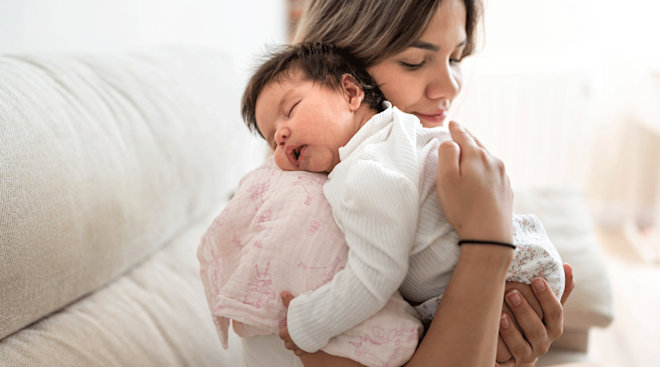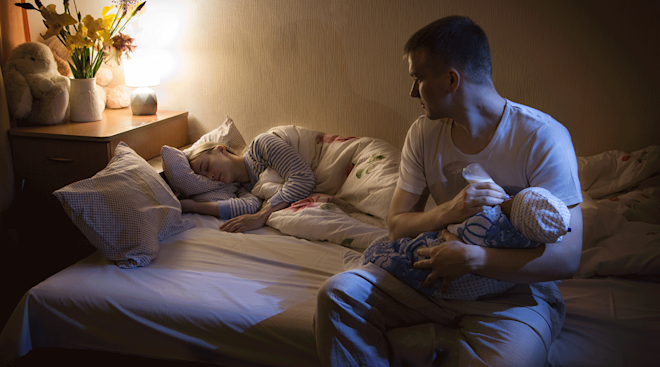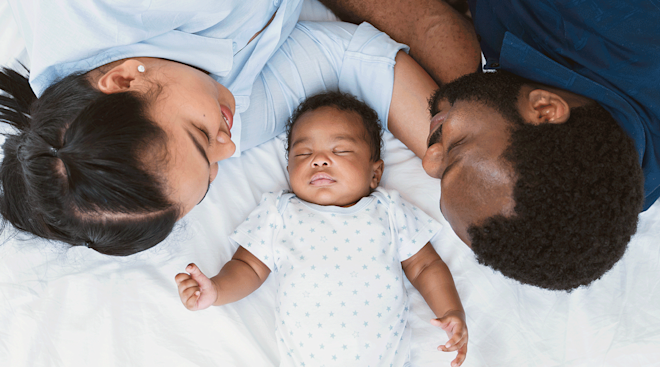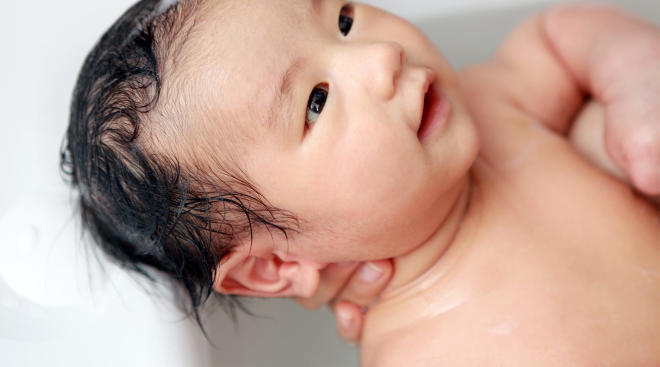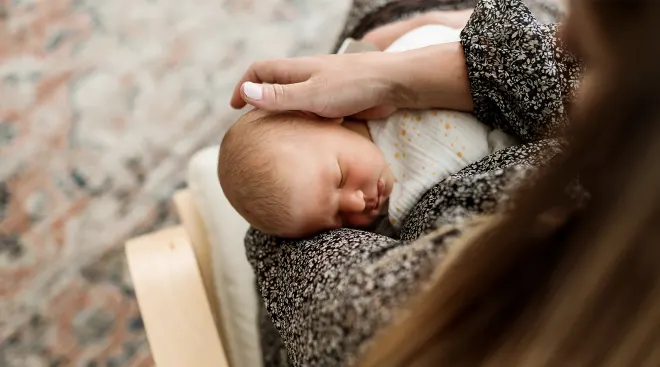When Do Babies Start Sleeping Through the Night?
Life with a newborn can have you feeling like an eternally awake zombie. It’s normal to wonder if you’ll ever re-enter the land of the sleeping again (spoiler alert: you will!). It might seem far off, but eventually baby will start sleeping through the night, and you’ll get to luxuriate in some well-deserved shut-eye. But exactly when do babies sleep through the night—and how can you encourage this process? Suffice it to say, they’ll gradually hit developmental milestones that make them more and more ready to sleep for longer stretches at a time. Read on to get the facts, plus check out our top tips to help get baby snoozing for longer.
Before we get into when babies sleep through the night, let’s go over what’s actually considered “sleeping through the night.” According to Rachel Mitchell, a certified pediatric sleep consultant and founder of My Sweet Sleeper, the definition will vary quite a bit depending on who you ask. “Many parents think sleeping through the night means their child sleeps 10 to 12 hours without waking up. But this is typically not what we’re referring to,” she says. “All of us actually wake-up throughout the night as we transition sleep cycles.”
Instead, sleeping through the night for babies typically means they’re able to transition sleep cycles without needing to be soothed or re-settled back to sleep by a caregiver. While there’s some variation, Mitchell says that most research considers this to be six- to eight-hour chunks of sleep as opposed to a full 10 to 12 hours. “It’s actually very uncommon to see a child sleep a full 10 to 12 hours without needing any intervention in the first 12 months of life,” she adds. As babies grow into toddlers, they may start to become better sleepers, but don’t be surprised if they continue to struggle to sleep fully through the night.
The truth is, every baby is different, so there’s no magic age when babies sleep through the night. Moreover, factors like weight, temperament, nutritional needs, activity levels and sleep hygiene all play a role, Mitchell says. “There’s a huge range for when babies sleep through the night,” agrees Kira Ryan, cofounder of Dream Team Baby, a baby sleep consultancy, and coauthor of the book The Dream Sleeper: A Three-Part Plan for Getting Your Baby to Love Sleep. “Usually around 4 months, sleep starts to consolidate,” she adds. This is likely due to some important developmental milestones that can help babies become better sleepers. The most obvious one is needing to feed at night. That said, not needing a feed doesn’t necessarily mean that baby won’t still want one.
Another developmental milestone that helps babies sleep through the night? The physical and cognitive ability to self-soothe and put themselves back to sleep, using methods like thumb sucking or rubbing their feet together, Ryan says. Plus, Mitchell notes that the ability to roll both ways, which usually happens between 3 to 5 months, can help. “Many babies prefer to sleep on their stomachs, which isn’t safe to allow them to do until they can roll both ways,” she says. (Be sure to always place baby to sleep on their back, as per the American Academy of Pediatrics (AAP). Learn more about safe baby sleep practices here.)
So when can babies sleep through the night? Here’s a run-down of what to expect based on baby’s age:
-
Newborns: Newborns spend at least 16 to 17 hours asleep in a day. Nevertheless, they shouldn’t be expected to sleep through the night for several reasons. First and foremost, they’ll need to eat at least every four hours at night, Mitchell says. Furthermore, they have little sleep consistency, due to a lack of circadian rhythm and melatonin production. “Because of this, newborn babies have a difficult time distinguishing day and night sleep,” Mitchell explains. “[They] often sleep all day and struggle to get longer stretches of sleep at night.” Lastly, adjusting to life outside the womb can be difficult. It’ll take time for newborns to get used to external stimuli and develop a regular sleeping pattern.
-
At 3 months old: A 3-month-old needs at least four hours of sleep during the day, and between 10 to 12 hours of sleep at night, Mitchell says—but how babies get their total sleep will vary in terms of nap schedules. “Around 3 months, night sleep does tend to consolidate a bit, but it’s still very normal for a 3-month-old to wake up one to three times overnight to eat, or to need to be settled back to sleep,” Mitchell says. It’s a baby sleep myth that infants should start sleeping through the night at 12 weeks. If it happens, consider yourself lucky. But for most babies, they may not sleep through the night for another month or two (or more!)—and that doesn’t mean you’re doing anything wrong.
-
At 4 to 5 months old: Once babies can go without night feeds, they may be able to sleep for a five- to seven-hour period, which Mitchell considers sleeping through the night. For babies 6 to 8 months, this stretch can last up to 9 hours, but this is dependent on several factors and can vary from baby to baby. According to Stanford Medicine, approximately two-thirds of infants can sleep through the night regularly by 6 months old. The National Sleep Foundation says that 80 percent of babies sleep through the night by the nine-month mark.
In the quest to help baby sleep through the night, setting up a routine and establishing proper sleep hygiene is key, Mitchell says. Below, some tips on how to help baby sleep through the night:
Create an optimal sleep environment
According to the AAP, baby should preferably sleep in the same room (but not bed) as their parents until they’re at least 6 months old, after which they can be moved into their own room. But whether they’re in your room or their own, the space should be dark, cool and quiet (besides white noise), Mitchell says.
Look for baby’s sleepy cues
Another key to get baby sleeping through the night is to be aware of their signs of sleepiness. “Pulling on their ears, rubbing their eyes and not making eye contact are all signs baby is tired,” Ryan says. “If they become very hyperactive and animated, it probably means they’re overtired.” When babies get overtired, it’s actually harder for them to get good rest, so try not to miss that important window.
Follow a consistent bedtime routine
Once you learn your child’s natural sleep windows, start following a consistent routine to help baby prepare for sleep, Mitchell says. Establish a series of activities to do with baby each night, about 20 to 30 minutes before bed. This could include a bath, feeding, singing a lullaby or reading a bedtime story. Eventually, baby will start to connect their bedtime routine with sleep. “Babies really enjoy having a bedtime,” Ryan says. “So much is happening to them every day: They’re being taken to different places, experiencing and learning new things. They’ll like having a set time each night where they know exactly what to expect.” The key is consistency. Don’t stress about doing the routine at the exact same time each night, but try to stick within a half hour of bedtime.
Make sure baby is comfortably full before bed
Ensuring baby is satiated by their feedings during the day and before bed will help them stay asleep. That said, you want to give them enough time to digest so they’re not overly full. “Giving baby a half hour to an hour to digest milk or food—and even longer if baby is prone to post-feeding gas and reflux—can actually get the night off to a smoother start,” Ryan says. Wondering what to feed baby for better sleep? “Unfortunately there’s no silver bullet when it comes to sleep-inducing foods,” Ryan adds. Whether baby is breastfed or formula-fed won’t make much of a difference for how long they stay sleep. But one thing parents should avoid is putting cereal in baby’s bottle. According to the AAP, it could lead to overfeeding and tummy problems, and even pose safety risks like choking.
Try to let baby self-soothe
While there’s absolutely nothing wrong with rocking baby to sleep each night, it may make baby dependent on you for sleep, Mitchell says. Putting baby down in their crib when they’re sleepy, but still awake can help them learn to self-soothe and sleep independently. Similarly, give it a minute or two if you hear baby on the monitor before checking on them—they may be able to fall back asleep without help. Of course, each family is different and, while this tip may work for some, it may not work for others. Ultimately, the goal is to ensure both you and baby get good sleep in a manner that works for your family.
Make sure baby gets lots of activity during the day
Research has found that babies who are physically active during the day tend to sleep better at night. Mitchell agrees: “It’s a key ingredient to helping your child sleep through the night.” Of course, while younger infants won’t be able to crawl and walk at a moment’s notice, practicing tummy time can help get them moving and develop key motor skills.
Don’t be afraid to wake baby up from naps
Newly minted parents know it’s hard not to rejoice when baby goes down for a nice long nap. But once baby is around 8 to 10 months of age, getting too much sleep during the day may interfere with their ability to sleep through the night. But should you wake a sleeping baby? The answer is yes—there are times when you’ll have to gently wake baby up from a prolonged nap. “Naps give babies little breaks to help their bodies process what they’ve learned and help them make it to bedtime. But if baby is sleeping too much, you should wake them up,” advises Ryan. In fact, she recommends babies as young as 4 months old be awake for about three hours before bedtime.
Consider sleep training
Sleep training is the process used to teach baby to fall asleep—and stay asleep—on their own. Two well-known and similar approaches are the “cry it out” and the Ferber methods, which help baby learn to fall asleep independently. Experts generally recommend starting sleep training when baby is 6 months or older, but know the level of success you’ll have will vary depending on your child and other factors, like baby’s personality and their sleep environment. “It’s a learning process for them—really, helping babies sleep all night is a learning process for parents too,” Ryan says. Talk to your pediatrician to figure out which sleep training method is best for your family—and know that sleep training may not be right for you at all. In fact, Mitchell says that rather than sleep training, it’s nutrition, daytime activity, wake windows and sleep environment that play the largest roles in baby sleep. Ultimately, the right methods to get baby to sleep through the night will greatly depend on your individual family circumstances. Make sure to consult with your pediatrician if you’re considering sleep training.
Of course, even if baby is developmentally ready, there could be other factors that may be contributing to their inability to sleep through the night or sleep regression, Mitchell says, including:
“It’s best to address [these] with your medical provider, and ensure you’re meeting your child where they are,” Mitchell says.
Sleep is far from an indulgence—it’s essential for you and baby. If you’re concerned baby isn’t getting enough sleep, or if you’re running on fumes and it’s affecting your physical and mental health, seek help from a professional, Mitchell says.
In those early, bleary newborn days, it’s only natural to wonder—with perhaps a hint of exasperation—“when do babies start sleeping through the night?” Trust us, it will happen. But until it does, remember to have realistic expectations based on baby’s age. “Try not to compare,” Mitchell says. “There’s a lot of pressure on parents to make sure their babies are sleeping through the night or sleeping independently, when in fact it’s very normal if they aren’t.” If baby is happy, healthy and getting some solid sleep, you can feel confident that you’re doing a great job.
Please note: The Bump and the materials and information it contains are not intended to, and do not constitute, medical or other health advice or diagnosis and should not be used as such. You should always consult with a qualified physician or health professional about your specific circumstances.
Plus, more from The Bump:
Rachel Mitchell is a Boston-based certified maternity and pediatric sleep consultant, former night nanny and mom to seven. She is the founder of My Sweet Sleeper, a team of maternity and pediatric sleep specialists that help growing families get some much needed shut-eye, as well as the founder of Sweet Sleep Academy, a pediatric sleep consultant certification program.
Kira Ryan is the cofounder of Dream Team Baby, a baby sleep consultancy, and coauthor of the book The Dream Sleeper: A Three-Part Plan for Getting Your Baby to Love Sleep. She’s a mom to three and received her bachelor’s degree from the University of Wisconsin.
Stanford Medicine, Infant Sleep, 2023
National Sleep Foundation, Sleep Duration Recommendations, 2015
American Academy of Pediatrics, Safe Sleep, 2023
American Academy of Pediatrics, Cereal in a Bottle: Solid Food Shortcuts to Avoid, May 2015
Learn how we ensure the accuracy of our content through our editorial and medical review process.
Navigate forward to interact with the calendar and select a date. Press the question mark key to get the keyboard shortcuts for changing dates.
































